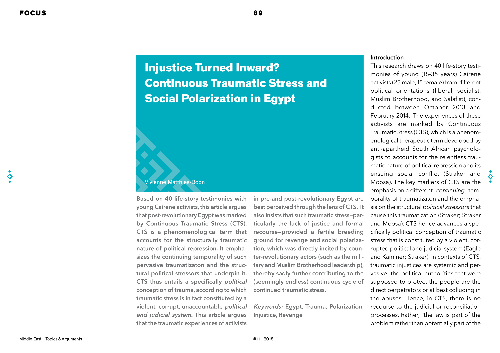Injustice Turned Inward? Continuous Traumatic Stress and Social Polarization in Egypt
Based on 40 life-story testimonies with young Cairene activists, this article argues that post-revolutionary Egypt was marked by Continuous Traumatic Stress (CTS). CTS is a phenomenological term that accounts for the structurally traumatic nature of political repression. It emphasizes the continuing...
Wedi'i Gadw mewn:
| Cyhoeddwyd yn: | Middle East - Topics & Arguments |
|---|---|
| Prif Awdur: | |
| Fformat: | Artikel (Zeitschrift) |
| Iaith: | Saesneg |
| Cyhoeddwyd: |
Philipps-Universität Marburg
2018
|
| Pynciau: | |
| Mynediad Ar-lein: | Mynediad Ar-lein |
| Tagiau: |
Ychwanegu Tag
Dim Tagiau, Byddwch y cyntaf i dagio'r cofnod hwn!
|
| Crynodeb: | Based on 40 life-story testimonies with young Cairene activists, this article argues that post-revolutionary Egypt was marked by Continuous Traumatic Stress (CTS). CTS is a phenomenological term that accounts for the structurally traumatic nature of political repression. It emphasizes the continuing temporality of such pervasive traumatizaton and the structural political stressors that underpin it. CTS thus entails a specifically political conception of trauma, according to which traumatic stress is in fact constituted by a violent, corrupt, unaccountable political and judicial system. This article argues that the traumatic experiences of activists in pre-and post-revolutionary Egypt are best perceived through the lens of CTS. It also insists that such traumatic stress—particularly the lack of justice and formal recourse—provided a fertile breeding ground for revenge and social polarization, which was directly incited by counter-revolutionary actors (such as the military and Muslim Brotherhood leadership), thereby sadly further contributing to the (seemingly endless) continuous cycle of continued traumatic stress. |
|---|---|
| DOI: | 10.17192/meta.2018.11.7807 |
 Publikationsserver
Publikationsserver